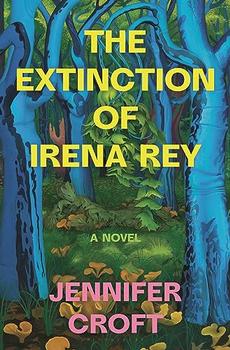Reading Guide Questions

Please be aware that this discussion guide will contain spoilers!
- The novel begins with a "warning" note from the translator, who we learn is also a character in the book. In this warning, Alexis writes, "Trust is crucial to every stage of the translation process" (1). In Alexis's footnotes, Emilia is represented
throughout the novel as an unreliable narrator. But how would you classify the
reliability of Alexis's translation—does she earn our trust as readers? Why or why
not?
- Relatedly, how does this framing set your expectations for the reading
experience? Are those expectations subverted at all by the novel's end?
- The novel begins in a collective narration, and then breaks off into the first person voice of Emilia. What effect does this have?
- "We worshipped Our Author" (5), the novel begins, the figure of Irena upheld to a
nearly divine status for most of what follows. How might the novel be
commenting on the concept of celebrity, literary and otherwise?
- How do Białowieża and the Białowieża Forest function as settings in the novel?
What might they be working to represent?
- "Each of this book's original sentences is like a tiny haunted house," writes Alexis
in her introductory translator's note (1). How else does the idea of haunting
appear in the novel? What role do ghosts and the paranormal play?
- "Alexis blew her candle out, as if to make herself invisible, as if someone like her
could ever escape anyone's notice," writes Emilia (60). In what other ways do the
characters of Alexis and Emilia enact, or subvert, the stereotypes of translator
and author as described in the novel?
- "If there is one thing in the world that actually interests Irena, it's fungi" (123).
Discuss the role of fungi in the novel. What does it represent?
- "How could everything be amadou now? Or had everything always been amadou
and I had simply never noticed it before?" (111). Likewise, what do you believe to
be the significance of the elusive amadou?
- "Notwithstanding that this is obviously fiction, I nonetheless remember this
differently," Alexis writes in one footnote (63). How might the novel relate to
conversations about perspective and memory in a post-truth era?
- "There's no such thing as death. Nothing ends. Everything only transforms" (85).
Consider this statement in accordance with the plot of the novel in its entirety.
What transformations take place?
- Consider Alexis's reference to Robert Frost's assertion that "poetry is what gets
lost in translation," and her understanding of its meaning: "To me, poetry is
concision, refinement—the effect of considerable loss," (268). Do you agree with
her interpretation? What is your own understanding of Frost's quotation?
- "Every original work of literature is a Pasiphaë that bathes the world in light. Yet
cursed with an insuperable desire for the Reader, a white bull, the text is doomed
to engender a Minotaur, over and over again. I am Ariadne falling to her knees
on Naxos, stricken by the folly of my kindness," Irena allegedly writes to her
translators (278). Consider further exploring these myths with your book club—
what deeper connections to the novel can you draw from them? Discuss.
- "Painting, sculpture, literature—even language itself, a system of abstractions
intended to stand in for the real world. That was the key: every creation that
served as a substitute for what was given in nature was art" (145). Do you agree
with this assessment? Do you believe art to be natural or unnatural? Discuss.
- What do you imagine a reverse translation of the novel might look like, in which
Emilia translates Alexis's narration?
- Consider Roland Barthes's "Death of the Author" theory, which argues that the
meaning of a literary work is to be interpreted and thus created by its readers,
rather than by the author and their own intentions for the text. How might this
theory apply to the metanarrative of the novel, and the plight of the translators?
How do you imagine they each might feel about Barthes's theory?
Unless otherwise stated, this discussion guide is reprinted with the permission of Bloomsbury Publishing.
Any page references refer to a USA edition of the book, usually the trade paperback version, and may vary in other editions.

 Book Reviewed by:
Book Reviewed by:





